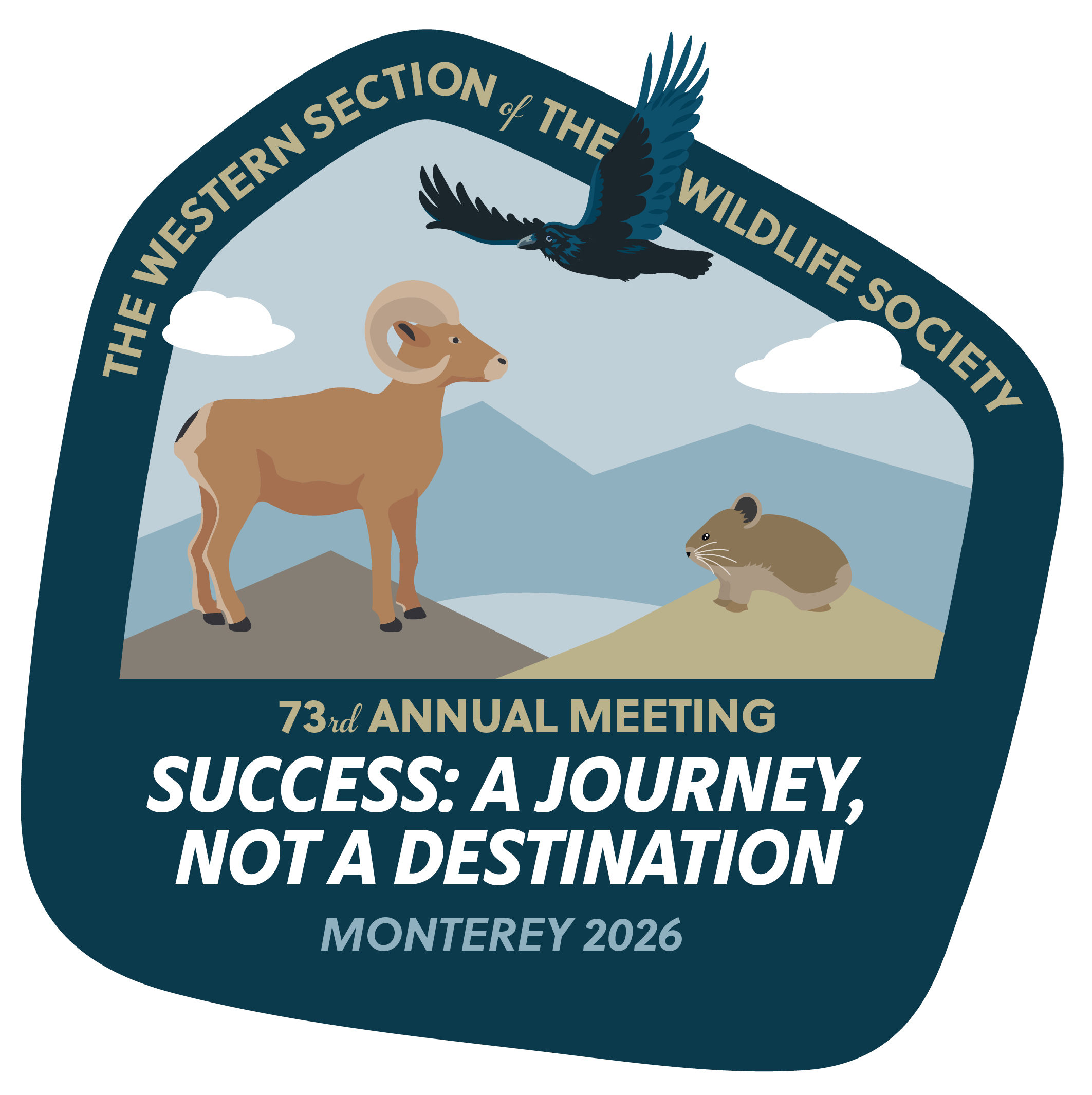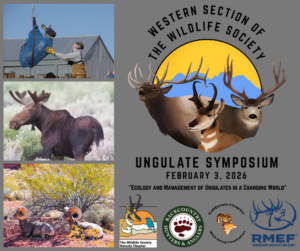Pre+Post Meeting Professional Development Workshops
Ecology and Management of Ungulates in a Changing World
- Tuesday, February 3, 2026 – 8:30am to 5:00pm
- Monterey Hyatt, Regency Ballroom
- Requires separate registration fee. Link to rates
- The Symposium is a stand-alone event, you do not need to attend the Annual Meeting to register for the Ungulate Symposium.
- Link to Ungulate Symposium Agenda
Symposium Co-Chairs:
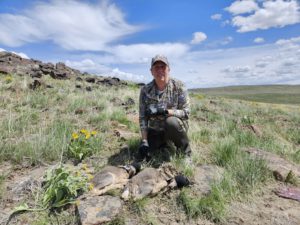 Dr. Kelley Stewart is a Professor of Wildlife Ecology at the University of Nevada, Reno. Her research focuses on effects of density dependence, reproduction, and nutritional condition of large mammals on movement patterns, resource selection, population dynamics, and community structure. More recently, her research has moved into investigating the links between nutritional condition and disease ecology to population demographics. Kelley teaches courses in wildlife ecology at both the graduate and undergraduate levels. She was named the Teacher of the Year in 2012 and Researcher of the Year in 2021 by the College of Agriculture, Biotechnology, and Natural Resources at UNR. She received the Raymond F. Dasmann Award for Professional of the Year from the Western Section of The Wildlife Society in 2022. Kelley has been primary advisor for 26 graduate students working on various aspects of ungulate and population ecology, 3 undergraduate honors students, and 2 postdoctoral research associates.
Dr. Kelley Stewart is a Professor of Wildlife Ecology at the University of Nevada, Reno. Her research focuses on effects of density dependence, reproduction, and nutritional condition of large mammals on movement patterns, resource selection, population dynamics, and community structure. More recently, her research has moved into investigating the links between nutritional condition and disease ecology to population demographics. Kelley teaches courses in wildlife ecology at both the graduate and undergraduate levels. She was named the Teacher of the Year in 2012 and Researcher of the Year in 2021 by the College of Agriculture, Biotechnology, and Natural Resources at UNR. She received the Raymond F. Dasmann Award for Professional of the Year from the Western Section of The Wildlife Society in 2022. Kelley has been primary advisor for 26 graduate students working on various aspects of ungulate and population ecology, 3 undergraduate honors students, and 2 postdoctoral research associates.
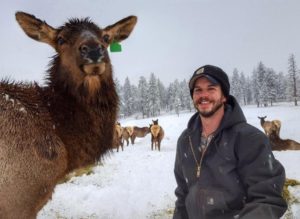 Dr. Nathan Jackson is a large mammal ecologist interested in population ecology and the effects of density dependence on movement, demography, population dynamics, and competition (intra- and interspecific). Nathan’s research leverages movement and demographic datasets to inform conservation and management decisions for large, herbivorous mammals. Nathan’s current research as a postdoctoral scholar at the University of Nevada, Reno focuses on migratory behavior of ungulates in the Great Basin. His current work is done in co-production with state (Nevada Department of Wildlife) and federal agencies (U.S. Geological Survey Corridor Mapping Team).
Dr. Nathan Jackson is a large mammal ecologist interested in population ecology and the effects of density dependence on movement, demography, population dynamics, and competition (intra- and interspecific). Nathan’s research leverages movement and demographic datasets to inform conservation and management decisions for large, herbivorous mammals. Nathan’s current research as a postdoctoral scholar at the University of Nevada, Reno focuses on migratory behavior of ungulates in the Great Basin. His current work is done in co-production with state (Nevada Department of Wildlife) and federal agencies (U.S. Geological Survey Corridor Mapping Team).
 Non-linear regression techniques for modeling wildlife habitat in R
Non-linear regression techniques for modeling wildlife habitat in R
- Monday, February 2, 2026 – 8:30am-5:00pm
- Monterey Hyatt, Regency Ballroom
- Requires separate registration fee. Link to rates
- The Symposium is a stand-alone event, you do not need to attend the Annual Meeting to register for the this training.
- Instructor: Kevin Shoemaker, University of Nevada-Reno
Telemetry data are often used to study wildlife habitat selection patterns. Traditionally, wildlife ecologists have used logistic regression to fit resource selection functions (RSF). These models are commonly used to predict resource use intensity across space and time, and to assess patterns of selection or avoidance. While useful, standard logistic regression has some limitations- one of which is that it makes strong simplifying assumptions about how animals respond to environmental gradients. Non-linear regression tools such as generalize additive models (GAMs) offer a relatively straightforward way for wildlife researchers to get more out of their telemetry data by allowing wildlife to respond to multidimensional habitat gradients in complex ways. In this one-day workshop, we will walk though a full RSF workflow, starting with raw telemetry data, building a full habitat model, interpreting model results and using the model to map resource use intensity across a study region. Participants should have a working knowledge of the R statistical programming language.
 Training for High Speed Rail Jobs
Training for High Speed Rail Jobs
- Tuesday, February 3, 2026 – 8:00am to 12:00pm
- Monterey Hyatt, Regency Ballroom
- Requires separate registration fee. Link to rates
- The Symposium is a stand-alone event, you do not need to attend the Annual Meeting to register for the High Speed Rail Training.
- Moderator: Debra Hawk, California High Speed Rail Authority
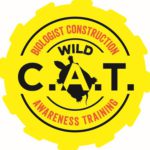 Wildlife Biologist Construction Awareness Training (WildC.A.T.)
Wildlife Biologist Construction Awareness Training (WildC.A.T.)
- Tuesday, February 3, 2026 – 1:00pm-5:30pm
- Monterey Hyatt, Regency Ballroom
- Requires separate registration fee. Link to rates
- The Symposium is a stand-alone event, you do not need to attend the Annual Meeting to register for the WildCAT Training.
- Moderator: Natalie Greer
 Using Cellular Tracking Technology nodes for data gathering: From planning to downloading data
Using Cellular Tracking Technology nodes for data gathering: From planning to downloading data
- Tuesday, February 3, 2026 – 8:00am-12:00pm
- Monterey Hyatt, Regency Ballroom
- Requires separate registration fee. Link to rates
- The Symposium is a stand-alone event, you do not need to attend the Annual Meeting to register for the this training.
Motus stations help track migratory animals at spatial scales from kilometers to continents, but what do you do if you need finer scale movement data? Cellular Tracking Technology CTT “nodes” are mini stations that can detect tags at the scale of tens to hundreds of meters. Networks of these nodes can be used to triangulate tag location. Centrally placed nodes can help you determine animal activity for activity budgets or life history stage analyses. This workshop will explore how to plan and execute a study of movement and activity patterns using nodes. It will also discuss how to prepare for, download and use the large volumes of data that result from node studies.
Instructors:
Wildlife Tracking Workshops with CyberTracker 
Well-rounded field skills and ecological literacy were once common among field biologists and emphasized in university curricula. In recent decades, however, these qualities and practices have rapidly diminished; numerous academic articles have highlighted this loss, warning of the impacts on future research, wildlife management, and conservation.
There are two ways to learn about wildlife tracking in Monterey! These events require advance registration and have an *extra fee.
(1) Wildlife Tracking Training
Friday, February 6, 2026 – 12:30pm to 5:30pm
Join us for an introductory, no experience required, no-pressure tracking training session. Unlike the Saturday Certification, there is no evaluation component, test scores, or certificates involved in this low-stress afternoon of learning. Participants will spend an entertaining afternoon in the field with skilled trackers, identifying and discussing tracks and sign of any and all animals encountered. We’ll cover tips for ID, wildlife behavior, and how the process of reliable track interpretation works. This course provides guidance for methods and resources to effectively begin tracking on your own. Limited to the first 20 registrants.
(2) One-Day Certification with CyberTracker Conservation
Saturday, February 7th from 8am to 4pm
Created alongside the San Trackers in South Africa, this process is designed to teach participants to track the way we’ve always learned: participants are asked to answer questions on a wide variety of tracks and animal sign (such as scat, feeding sign, burrows, etc) before the group discusses them at length. Though no prior experience is required to participate, please note that these evaluations are designed to test the current ability of participants, recording their answers right from the start. Each question is scored based on a difficulty scale, and participants will receive a certificate if enough points are earned through correctly answering the questions. This process effectively engages the core skills of competent trackers and the result is not just a significant upgrade in current ability—it provides participants a clear framework to keep improving in the field. Limited to 18 participants.
(3) An Introduction to the CyberTracker Process and Practical Wildlife Tracking
- Free Online Workshop (all are welcome)
- January 22nd from 5-6pm (Pacific)
- Link to more info
In the early 1990s, the CyberTracker Certification System was developed in Southern Africa with San master trackers to conserve and cultivate practical wildlife-tracking skills among indigenous communities and wildlife professionals. Here in North America the system has proven to rapidly develop essential field skills and natural history knowledge among biologists, employees of State and Federal agencies, wildlife guides, and the general population alike. In this presentation we’ll explore why the CyberTracker process–and learning to track in general–is so uniquely effective for facilitating careful observation and direct, inquisitive interaction with the natural world. These particular field skills, sometimes referred to as “the origin of science,” are growing rapidly among a large and diverse number of communities across N. America–please join us for this entertaining, wide-ranging discussion!
Instructor – Casey McFarland trains biologists, research teams, wildlife guides, and the public to read and interpret the tracks and signs of wildlife. A Senior Tracker and International Evaluator for CyberTracker Conservation, he has given over 200 Tracker Certifications and various trainings around the globe to develop and support tracking skill and ecological knowledge. Casey has authored several books and is the Executive Director of Tracker Certification North America.
